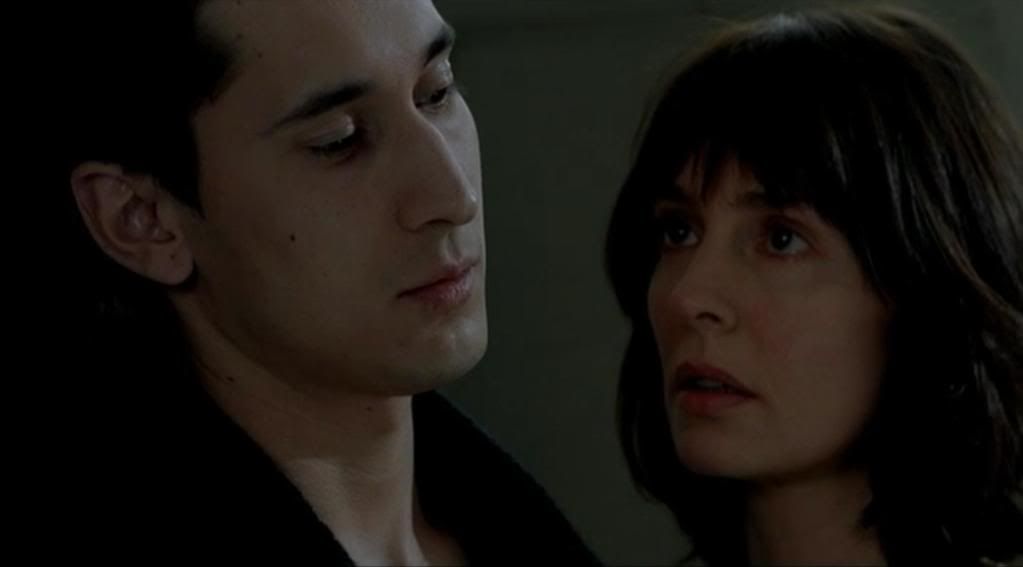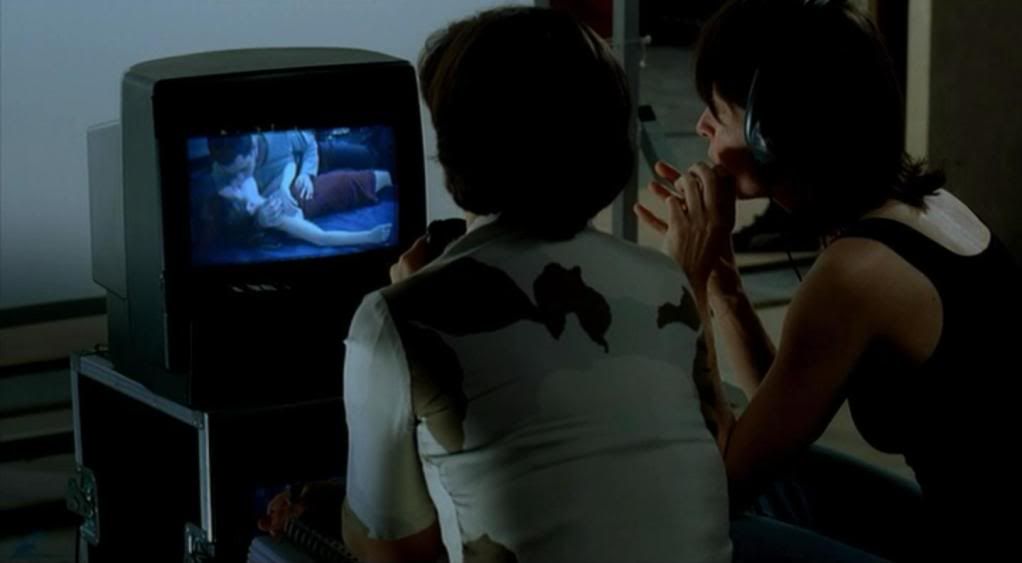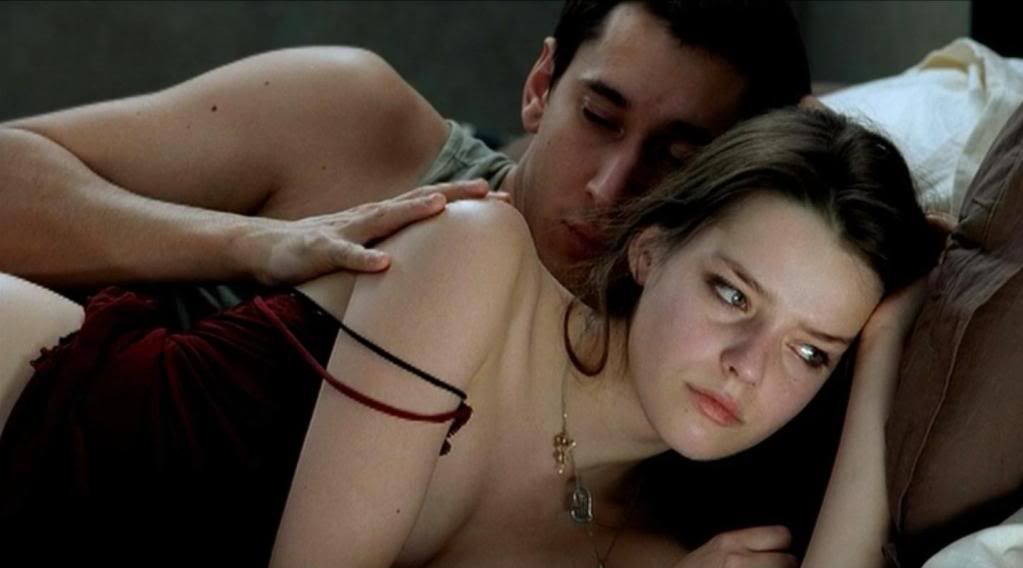
In Sex Is Comedy, Catherine Breillat lays bare the essence of her cinema in an especially direct way, making a metafictional, quasi-autobiographical film about a director making a film. Jeanne (Anne Parillaud) is a director very much like Breillat, a director whose work deals candidly with the antagonistic, push/pull, love/hate nature of male/female dynamics. Her latest film builds up to a scene of a young girl losing her virginity, but to capture onscreen the complicated emotions of this moment, she must overcome the resistance of her unreliable actors, who are never named but only called, somewhat pompously, the Actor (Grégoire Colin) and the Actress (Roxane Mesquida). As with much of Breillat's work, it's all too obvious that she's laying out a thesis and singlemindedly setting out to prove it.
It should come as no surprise to anyone who's seen the director's other films precisely what that thesis is. For Breillat, sex is a power struggle, love is a power struggle, virtually any relationship between a man and a woman can be boiled down to a power struggle. It's all a vicious game, which is why sex is comedy, although "sex is tragedy" would be equally apt. Jeanne, standing in for Breillat, stages love scenes like a war, and the behind-the-scenes glimpses this film provides into Breillat's working methods — the film is supposedly based particularly on her experiences while making Fat Girl — are fascinating. She's constantly looking for tension, for anxiety, arranging the actors into uncomfortable postures, the girl's elbow digging into the guy's ribs, or the girl putting her arm around his neck in a pose that's more like a wrestling headlock than an embrace. Jeanne is alternately tyrannical and tender on the set, and she has almost intimate, sexually suggestive relationships with both the actor and her assistant Léo (Ashley Wanninger), mirroring the relationship in the film she's making.

Unsurprisingly, Breillat finds, on the set, a neat parallel for romantic relationships in the power struggle between actor and director, each of them pushing at and pulling on one another by turns, fighting for control and dominance, arguing over every petty detail, like whether the actor will take his socks off or not for one scene. She recreates, with him, precisely the uncertain, will-she-or-won't-she vibe that she's trying to capture onscreen, and it's unclear if this relationship with the actor is "real" or simply a game, a way of getting the performance she wants out of him by keeping him destabilized even between takes.
That's one constant thread running through the film, a suggestion that this film's portrayal of faked intimacy between actors can be seen as a parallel for the games and power struggles that also go on in real relationships. The film's title encourages the comparison: sex is comedy, not only on a film set, but in the real world as well, where these same struggles and masquerades and fakeries go on without being acknowledged as explicitly as they are here.
Much of the film is dedicated to constant introspective meta dialogues, with everyone debating the nature of acting, the struggles of translating one's vision into cinema, the difficulties of filmmaking. It often feels as though Breillat is giving an interview, speaking through her characters about her own filmmaking process and her own ideas. It's interminably interesting and frustrating, and it exists mainly as a commentary on Breillat's other films, to the point where it's difficult to separate it from the rest of her oeuvre. It's a film where a director employs sexual manipulation in order to convey sexual manipulation onscreen, a tricky paradox that might just signify Breillat addressing or acknowledging the critics who have accused her of making exploitation films.

It all builds up to the moment when the actors finally perform their big love scene, and after some false starts they infuse the scene with genuine, harrowing emotion, particularly Mesquida, who's shivering and spasming and crying as Colin coaxes her character into letting him take her from behind. The scene is intense and shattering, though it doesn't even remotely capture the conflicted, complex layers of desire and reluctance that Jeanne had claimed to want from the scene — instead, typically of Breillat, the sex just looks unpleasant, like a rape or a near-rape, forced upon the unwilling girl by the insistence of the guy. It's strange that Jeanne is so insistent that girls both desire sex and are scared of, but all that comes across, here as in many of Breillat's films, is the fear, the pain, the unpleasantness, and none of the supposed desire. (One of the reasons that Breillat's more recent fairy tale films have been her best work yet is that they do embody the contradictory dichotomy that's only given lip service here.)
When the scene is over, the actress is still sobbing, and Jeanne, her own eyes red and her face overcome with emotion, embraces her and comforts her. The extra level comes from the awareness that Mesquida is playing an actress overcome by her part, leaving one to wonder how much of this is genuine, how much acted, and how closely the film within a film mirrors the film that Breillat actually made. In any event, it's a complex ending to a film that is otherwise only intermittently engaging for much of its length, even if it does add some crucial context to an understanding of Breillat's work.

1 comment:
One of the most difficult aspects of this film is what is focused on compared to Fat Girl - Anais Reboux is gone as the voyeur in favour of a focus on the 'prettier' sister and perhaps most damningly the male lead is replaced between the two films.
It might narrow the focus down into the relationship between a director and her lead actress (with if we are being charitable Parillaud's director taking on the other sister's voyeuristic role from Fat Girl), but the intense focus on the female side of the relationship while the male actor is parodied as having no real problems with, or thoughts about, the role once he is able to pick out a larger rubber phallus for the love scene, kind of ruins Sex Is Comedy for me.
My feeling about Breillat's films is that they are about male 'enablers', whether in a good or a bad way. That is perhaps most obvious in something like Romance, as our heroine cycles through and discards various different types of men and their sexual behaviours. It is present in Fat Girl too, in the sense of the absence of the father and the troublingly liberating (willed into existence?) rapist/murderer. And reaches its pinnacle in one of my favourite Breillat films, the ghostly Anatomy of Hell, in which it seems that the director is acknowledging that simplification of both sexes into reductive archetypes when it comes to sexual behaviour.
Anyway I certainly don't think that Sex Is Comedy measures up to Fat Girl/A Ma Soeur!, which is a film that really does show that advance/retreat sense of cajoling to sexual behaviour along with the willing and inevitable complicity of even the innocent in their own loss of innocence.
Post a Comment